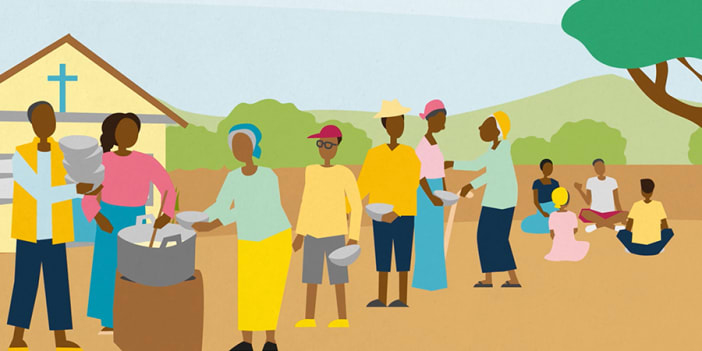Joseph and his response to drought
by Mike Wall and Vinay Samuel.
Read Genesis Chapter 41. Joseph, who was in prison at the time, was called to interpret some vivid dreams of the Pharaoh. His explanation of what God was saying through these dreams was so convincing that Pharaoh put him in charge of Egypt. Joseph organised the storage of all surplus grain during the seven years of good harvests. He asked that one fifth of each year’s harvest should be required from farmers and stored on behalf of the government. The grain was stored in warehouses in nearby cities.
At the beginning of the drought, the warehouses were opened and people allowed to buy grain. As the situation got worse, livestock, labour and land were accepted in exchange for grain (Genesis 47:13-21). People from neighbouring countries were allowed to buy grain too (Genesis 42:1-5).
At the end of the seven years of drought, Joseph gave seed to people for planting. Because all the land in Egypt now belonged to Pharaoh, Joseph asked that a tax of one fifth of the crops produced should be given to Pharaoh. The remaining four fifths of the harvest belonged to the people.
Key points
- Joseph had the skills of good management. He was guided by God and so able to plan carefully, and to predict what was likely to happen. In order to carry out his clear planning, he needed authority and power. Anyone put in charge of a disaster management programme also needs authority to make and carry out quick decisions that others will respect and obey.
- Joseph’s plan seemed good to Pharaoh and all his officials (Genesis 41:37). The local leadership accepted and trusted his plans. Joseph had the trust of all the people. In emergency situations there needs to be that trust in the leadership. People are under great strain and need a leader they can trust.
- One fifth of the harvest was taken from the farmer for a food reserve. Joseph developed a new pattern of land use. Certain things which are developed in an emergency can become regular patterns of life.
- The way in which the grain was stored and distributed spread the work and responsibility all around the country. Instead of having one huge centre, Joseph encouraged each region to set up warehouses.
- Egypt was the only land that was prepared for the famine in the Middle East. It met its own needs as well as those of neighbouring countries. Good disaster planning can have far-reaching benefits.
- No indication was given that this drought was a judgement from God on Pharaoh and Egypt. It appears to have been a natural calamity. But God used the disaster relief project to save Jacob’s family and the future nation of Israel. Disaster planning can be used by God to do good and achieve his purposes in the world.









